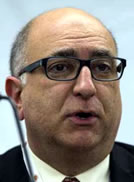Stem cell transplantation is a safe treatment option for patients with HIV-related lymphoma
Data presented at the 2014 Annual Meeting of the American Society for Hematology (ASH) indicate that patients with chemotherapy-sensitive, relapsed or refractory HIV-related lymphoma (HRL) may be treated successfully with stem cell transplantation using the modified BEAM regimen. As such, patients with a treatment-responsive HIV-infection and HRL should be considered candidates for an autologous stem cell transplantation if they meet the standard transplant criteria.
The risk of non-Hodgkin lymphoma (NHL) and Hodgkin lymphoma (HL) is at least 25 times higher in HIV-infected patients as compared to the general population. Historically, HIV-infected patients had inferior outcomes and increased treatment-related morbidity and mortality over uninfected patients. Highly active antiretroviral therapy (HAART) significantly improved the prognosis for patients with HRL and permitted them to have a treatment identical to that of uninfected patients. Since HRL patients are immune-compromised, they have been considered to be ineligible for stem cell transplantation, which is regarded the standard of care for relapsed or treatment-resistant lymphoma. As a result, HRL patients remain at a significant treatment disadvantage.
To examine whether stem cell transplantation could be a safe and an effective approach for patients with HRL, a large, multi-center study was conducted among 40 patients with a controlled HIV infection receiving autologous stem cell transplants with a high-dose preparative regimen. Patients with a treatable HIV-1 infection, older than 15 years of age, with an adequate organ function and aggressive NHL or HL were included in the study and underwent an autologous stem cell transplantation (AHCT) using the BEAM regimen (carmustine 300 mg/m2 day -6, etoposide 100 mg/m2 twice daily on days -5 to -2, cytarabine 100 mg/m2 on days -5 to -2 and melphalan 140 mg/m2 on day -1). Patients received AHCT on day 0 and standard supportive care through discharge. HAART was withheld during the preparative regimen and until therapy-related gastrointestinal toxicity resolved. The primary trial objective was the estimation of one-year overall survival (OS), while secondary objectives included lymphoma response post-transplant, progression-free survival (PFS), transplant-related mortality (TRM), infection-related complications and recovery of hematological function (RHF) post-AHCT.
At 100 days post-transplant, 36 patients (92.3%) had achieved a complete response, one (2.6%) reached partial remission, and two (5.1%) had relapsed. One patient had died. The cumulative incidence of relapse or progression at one-year post-AHCT was 12.5% and the estimated probability of one-year PFS was 82.3%. Within one-year of AHCT, 13 patients experienced grade 3 and 2 patients grade 4 toxicities (1 patient with mucositis and 1 patient with dyspnoea, hypoxia, cardiac arrhythmia and hypotension). Within a year after transplant, 17 patients (42.5%) developed a total of 42 unique infections. Nine of 17 patients developed a severe infection. After a median follow-up of two years, the one-year survival among the transplanted patients was 86.6%. The cumulative incidence of transplant-related mortality was 5.2%.
In summary, these impressive survival data demonstrate that autologous stem cell transplantation can be a highly effective, tolerable and not overly toxic treatment option for patients with HIV-associated lymphoma.. These results provide a strong argument that HIV or AIDS status should not be a barrier to autologous stem cell transplant for patients who meet the standard eligibility criteria.
Reference
Alvarnas J, Rademacher J, Wang Y, et al. Autologous Hematopoietic Stem Cell Transplantation (AHCT) in Patients with Chemotherapy-Sensitive, Relapsed/Refractory (CSRR) Human Immunodeficiency Virus (HIV)-Associated Lymphoma (HAL): Results from the Blood and Marrow Transplant Clinical Trials Network (BMT CTN 0803)/AIDS Malignancy Consortium (AMC-071) Trial. Presented at ASH 2014; Abstract #674.


